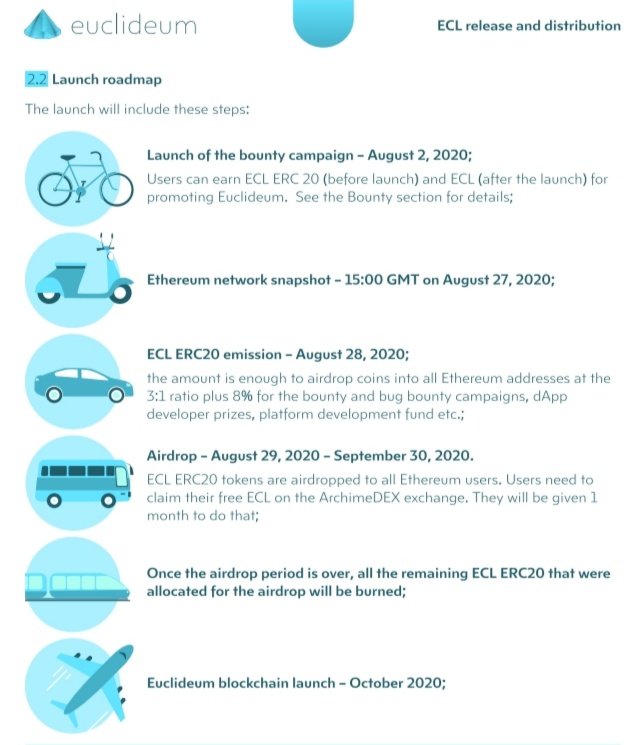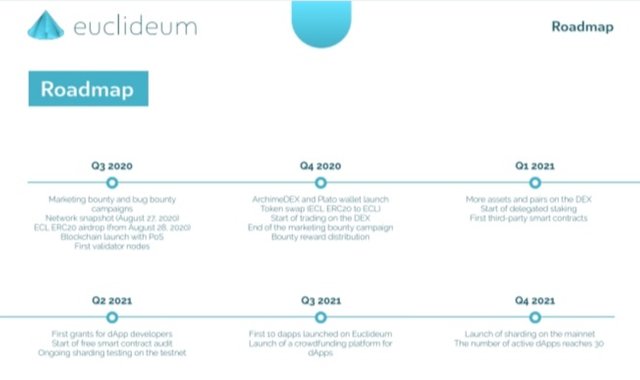Introduction
We may describe the Euclideum network as an improved version of the Ethereum network with new features such as the Proof-of-Stake (PoS) consensus and an innovative delegated staking. The cryptocurrency of the Euclideum blockchain network is Euclid, denoted as ECL. The network offers are cheaper stake in launching a node, compared to Ethereum, Euclideum launches with 30 ECL and Ethereum uses 32 ETH. Similar to Cosmos and Tezos, the delegated staking is a new feature on the network that allows users to delegate their ECL tokens to their preferred choice. When the staking is complete, the user gets a share from the rewards.
Ethereum Slow Transactions
The creation of a more scalable version of the Ethereum network has occurred repeatedly since the problem has been a recurring event. Ethereum is built on the Proof-of-work (PoW). The most recent happened between June and July 2020, and the need for a more sustainable solution became glaring. Extensive network congestions and transactions were lagging, which increased transaction fees. Over 100,000 transactions remained pending due to the lagging, which was because of the widespread and extreme congestion of the Ethereum mempool.
Huge projects, which were the prominent gas consumers, performed on the network attributed to the congestions and lagging. These projects such as established coins like USDT (Tether) and USDC (USD Coin) offered secured investments and for that reason, users carried out numerous transactions using them during the coronavirus pandemic. The translated to high transaction fees charged on the Ethereum network. Users of ETH paid nearly more than double the fees charged on the Bitcoin network. On a mean value, the transaction fee skyrocketed to 1.5 USD.
The objective of the development team that spurred the creating of the Euclideum project is to offer a lasting solution to the problems experienced on the Ethereum network. This is because; delaying the project for another time to allow the improvement of a scalable version of Ethereum is not feasible. The founding team of the Euclideum network considered specific issues of the Ethereum network that required a long-term solution. These issues bordered on network lags and congestions, high transaction fees, blocks without reward, and pending transactions.
Euclideum Fast and Cheap Transactions
The usual solution offered by the Ethereum network is the advent of lagging and congestion was to increase the gas limit. This solution only resolves the high transaction fee but does not stop the lagging in the long run. A more effective and long-lasting solution is to switch the consensus of the Ethereum network to Proof-of-Stake, but this can take a long time and transactions need to be completed.
With a focused objective to proffer a durable solution, the development team of Euclideum decided to introduce the network on the Proof-of-Stake consensus, starting from the inception of the project. This has proved that reducing the lagging and congestion of transactions on a network is possible within a short period. Euclideum network is expected to launch its platform with a processing capacity of a minimum of 100 transactions per second, which is double the current speed of Ethereum. This will also translate to cheaper transaction fees charged for performing transactions on the network.
USEFUL LINKS
Website: https://euclideum.com
Telegram: https://t.me/euclideum_bounty
Twitter: https://twitter.com/euclideum
Facebook: https://www.facebook.com/euclideum.network
ANN: https://bitcointalk.org/index.php?topic=5266231
Whitepaper: https://euclideum.com/whitepaper.pdf
AUTHOR'S DETAILS
Bitcointalk Username: Onyiiok
Bitcointalk Profile Link: https://bitcointalk.org/index.php?action=profile;u=2766257


